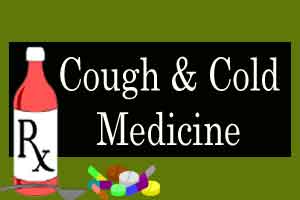- Home
- Editorial
- News
- Practice Guidelines
- Anesthesiology Guidelines
- Cancer Guidelines
- Cardiac Sciences Guidelines
- Critical Care Guidelines
- Dentistry Guidelines
- Dermatology Guidelines
- Diabetes and Endo Guidelines
- Diagnostics Guidelines
- ENT Guidelines
- Featured Practice Guidelines
- Gastroenterology Guidelines
- Geriatrics Guidelines
- Medicine Guidelines
- Nephrology Guidelines
- Neurosciences Guidelines
- Obs and Gynae Guidelines
- Ophthalmology Guidelines
- Orthopaedics Guidelines
- Paediatrics Guidelines
- Psychiatry Guidelines
- Pulmonology Guidelines
- Radiology Guidelines
- Surgery Guidelines
- Urology Guidelines
Cough and cold medications harmful to kids

Toronto : Readily available over the counter cough and cold medications can do your kid more harm than good, warn Canadian researchers who have suggested stronger measures to curtail the use of these medications among children.
The research comes on the heels of India recently banning the manufacture and sale of more than 300 combination medicines, including two widely used cough syrups.
For the current study, the researchers asked parents of 3,500 children under the age of six about their use of cough and cold medications from 2008 to 2011.
The researchers found that about 18 percent of children still received cough and cold medications despite label warnings advising against their use in children under the age six in 2009.
Following the introduction of Health Canada's 2009 labelling requirement, there has been a small decrease in over the counter cough and cold medication use in children down from 22 per cent before the change.
The study was published in the Canadian Journal of Public Health.
We found that a large number of young children continue to receive over-the-counter cough and cold medications even with evidence of harm, public health advisories from government agencies and mandated labelling requirements for manufacturers, said lead researcher Jonathon Maguire from St. Michael's Hospital in Ontario.
In addition, evidence suggests these medications are not effective in young children. With no real benefit and documented risks, stronger measures may be needed to curtail their use, Maguire noted.
I think a lot of parents would be surprised to learn that these medications can be harmful to children, Maguire said.
Better public awareness as well as making these readily available medications harder to purchase may help to reduce their use, Maguire pointed out.
Source : IANS
The research comes on the heels of India recently banning the manufacture and sale of more than 300 combination medicines, including two widely used cough syrups.
For the current study, the researchers asked parents of 3,500 children under the age of six about their use of cough and cold medications from 2008 to 2011.
The researchers found that about 18 percent of children still received cough and cold medications despite label warnings advising against their use in children under the age six in 2009.
Following the introduction of Health Canada's 2009 labelling requirement, there has been a small decrease in over the counter cough and cold medication use in children down from 22 per cent before the change.
The study was published in the Canadian Journal of Public Health.
We found that a large number of young children continue to receive over-the-counter cough and cold medications even with evidence of harm, public health advisories from government agencies and mandated labelling requirements for manufacturers, said lead researcher Jonathon Maguire from St. Michael's Hospital in Ontario.
In addition, evidence suggests these medications are not effective in young children. With no real benefit and documented risks, stronger measures may be needed to curtail their use, Maguire noted.
I think a lot of parents would be surprised to learn that these medications can be harmful to children, Maguire said.
Better public awareness as well as making these readily available medications harder to purchase may help to reduce their use, Maguire pointed out.
Source : IANS
Next Story
NO DATA FOUND

Disclaimer: This site is primarily intended for healthcare professionals. Any content/information on this website does not replace the advice of medical and/or health professionals and should not be construed as medical/diagnostic advice/endorsement or prescription. Use of this site is subject to our terms of use, privacy policy, advertisement policy. © 2020 Minerva Medical Treatment Pvt Ltd